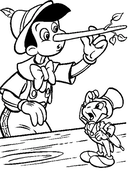 The word lie, meaning to speak falsely or tell an untruth, has been part of the English language since the 1100s. Its roots are buried deep in Germanic languages. Lie’s linguistic cousins show up in Norse (ljuga), Danish, (lyve), Gothic, (liugan), Frisian, (liaga), & German (lugen). It shouldn’t surprise us that we have an impressive number of synonyms, near-synonyms & idioms available to substitute for that terribly direct & offensive three-letter word, lie. Instead of lying, businesslike folk might reframe, mislead, evade, misspeak, or misstate, while artsy types might buff, burnish, embroider, or fictionalize. We can also whitewash, inflate, dissemble, or spin, and those of us who lie regularly can lay claim to any number of afflictions: necessary disingenuity, factual flexibility, serial exaggeration, or the ever-popular; fictitious disorder syndrome. Ah, but all lies are not equal. For instance, to lie is to make a deliberately false statement, to prevaricate is to quibble or confuse in order to avoid the truth, to fabricate is to invent a false story, to equivocate is to deliberately use ambiguity to mislead, & to fib is to tell a falsehood about something unimportant. Good readers if you have any thoughts on all this dishonesty, I’d love to read them in the comments section. Big thanks to this week’s sources: Ralph Keyes’ Euphemania, the 1959 Webster’s New World Dictionary of the American Language, Disney Images, Wordnik, Etymonline, & the OED.
2 Comments
 This post celebrates a word all two-year-olds appreciate. Additionally, the good folks who wrote the OED appreciated it enough to give it a nearly two-page entry. No came to English as early as the 1200s through Old English from the Proto-Indo European word ne, meaning no, not, never. And ne is the grandmother of oh-so-many modern words: Never, which started out as næfre, meaning not ever, came to the language even before no, appearing in the first Anglo Saxon tale to be written down in that barbaric tongue they called Anglish in the epic poem Beowulf, some time before 1000. Nothing, which came to English as an adverb in 1200, added noun to its quiver in 1600, & added adjective in 1961. The word not came from its earlier form, naught, arriving in English in the 1200s. Interestingly, naught came from an even earlier term no whit, meaning no thing. The combining form non- showed up in the 1300s, giving us non sequitur, nonviolence, non-fiction, non-conformist, nonfat milk, & any number of other non-s. Null, which came through Latin & Middle French, arriving in English in the 1560s and mostly meaning nothing, zero, void, is assigned eight different meanings in the OED – a delicious bit of irony. Nil came through Latin & arrived in English in 1833, Naughty showed up in the 1300s, meaning having nothing. By the 1520s naughty had picked up its second meaning, wicked, evil, or morally wrong. By the 1630s its third meaning applied to misbehaving children, & by 1869 its fourth meaning, sexually promiscuous, jumped on board. It occurs to me the etymology of naughty provides a fascinating sociological study. Any nay-saying, followers? Any thoughts on NO? Big thanks to this week’s sources: Word Detective, Wordnik, Etymonline, & the OED. 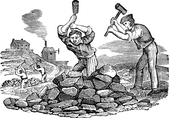 Thanks to a phone call from Dennis Rogers of Pflugerville, Texas, I’ve been reminded of my interest in regional language use. This week’s brief post includes some examples I hope this taste will get you sorting through your memories for regional usage you can send my way for a future post. Dinkum entered English n 1888, meaning hard work. Hailing from Australia, dinkum added the meaning honest & genuine by 1894. Though it may have its roots in Lincolnshire, nobody’s really sure where dinkum came from. The Old English word for ant was æmete, which explains why in some parts of England ants are called emmets, Interestingly,holiday tourists in & around Cornwall are also known as emmets. Swivet appears to have come from the Kentucky environs in at late 1800s and nobody’s sure about its roots. A swivet is a fluster, a confusion. A related idiom is “Don’t get your knickers in a swivet.” May your week find you avoiding emmets & swivets of all kinds, enjoying good company (most likely virtual) and good food (hopefully not virtual), & getting a restful respite from dinkum (first meaning). In the meantime, please send any regional words, idioms or turns of phrase my way. Big thanks to this week’s sources: Suko’s Notebook, Wordnik, Etymonline & the OED.  In the previous post, we took a look at the etymologies of frog, weasel, plover, caterpillar, narwhal, muskrat, & platypus. Now, onto more! Aardvark came to English in 1833 from Afrikaans (a branch of Dutch). It’s a compound Dutch word meaning earth-pig (aard = earth & vark = pig). And thanks to Christine Ahern for asking about raccoon, which came to our language from Algonquian in the 1600s, written raugroughcum in Captain John Smith’s journals. It translates to he scratches with the hands. Another English word that came from Algonquian is moose, written by various “first inscribers” as muns, moos, mooz and moz. The story is that an earlier form was moosu, meaning he strips off. This referred to the animal’s habit of stripping bark from trees for its meals. The word penguin first referred to the now-extinct great auk of Newfoundland. Apparently the birds we now call penguins share some characteristics with the great auk. Sir Francis Drake wrote this word into English in the 1570s. The one proposed source is pooh-poohed by most etymologists, but for the sake of interest, I’ll state it here. In Welsh, pen means head and gwyn means white, and the long-gone great auks of Newfoundland had a big white spot between their eyes. The word slug came to English in 1704 to refer to a shell-less land snail. It was taken from the word sluggard, which referred to a slow-moving & useless person. Though the existence of slugs pre-dates the existence of sluggards (or humans for that matter), we anthrocentric humans labeled those lazy people a good 500 years before labeling the shell-less snail. Toad came from who-knows-where about the time we started calling English English. It had several forms including tadie, tadige & toadie. Rest assured, hard-working etymologists are – as you read - digging through old manuscripts to solve this centuries-old mystery. Like toad, barracuda remains a mystery. It arrived in English in 1607 probably through American Spanish from some Caribbean language, but nobody knows but the barracudas, & they’re not talking (it can’t be easy to enunciate through all those teeth). If an Old English speaker were to have seen what we would today call a hamster, s/he would have correctly referred to it as a German rat. By the 1600s, though, the German word hamster showed up in English, eventually eclipsing the less attractive moniker. It is thought that the German word hamster may have come from a combining of the Russian word chomiak and the Lithuanian word staras. Though my sick and twisted sensibilities wish chomiak meant German and staras meant rat, my sensibilities are dead wrong. Both words mean hamster. So, which of these do you find most interesting or unlikely? Big thanks to this week’s sources: Dictionary.com, Wordnik, Etymonline & the OED. 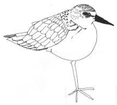 Many etymologies of animals' names are pretty straightforward. Fish, for instance, comes from a source that meant fish. The original word for fly meant to fly. Ho hum. Some names for critters, though, are a tad more interesting. Plover made its way to English around 1300 from Vulgar Latin through French. Its original meaning was belonging to rain. Apparently the plover made its migratory way through the British Isles just as the rainy season began. Frog comes from fruska, a Proto-Germanic word meaning hop, and has been with us since we started calling the language English. Another word that came to English as Old English was born is weasel. It came from the Proto-Germanic word, wisulon, & means stinking animal. Interestingly, wisulon is also the grandmother word to another slightly larger animal with a distinctive smell, the bison. In the mid-1400s, caterpillar came to English from the French word chatepelose, meaning shaggy cat. Apparently, many languages named the caterpillar after other animals: American English - wooly bear, Portuguese – lizard, Italian – both little cat & little dog. Narwhal came to English in the 1650s through Danish & Norwegian from the Old Norse word nahvalr. The pale hide of this animal inspired the Old Norse to call it the corpse-whale (na-meaning corpse & hvalr meaning whale). Muskrat made it into English in the 1610s from the Algonquian word muscascus, which meant it is red. The very unlikely animal the platypus got its name, not from any number of unexplainable physical characteristics, but from its flat feet. Platy is Greek for flat & pus is Greek for foot. Platypus came to English in 1799. Shark arrived in English in the 1560s. Its origin is a complete mystery. Good readers, which etymology was most surprising, or most unlikely? Big thanks to this week’s sources: Dictionary.com, Wordnik, Etymonline & the OED. 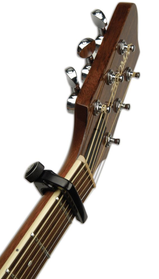 Some time ago I played in an old time string band. Whenever a particular musical acquaintance (who shall remain nameless) showed up at our rehearsals or shows, our banjo/guitar/harmonica/mandolin player’s capo would disappear. Thus, this post’s title. For those of you who don’t know the word, a capo is a device used primarily by guitarists. It temporarily shortens the length of the strings, which changes the key without changing the fingerings. Capo came to English in 1946 from Italian & Latin and means head stop. A capo stops the vibration of the strings early, functionally moving the head of the instrument closer to the instrument’s body. The word capo can also refer to the head of a mafia family. This meaning entered English a few years later in 1952. Capo has a couple of cousins with stories to tell. Caprice means a sudden change of mind or whim, though it originally meant a shivering. It came to English in the 1660s from French. Though some believe its origins lie in the word capro, or goat, most evidence suggests that caprice comes from the Italian term capo riccio, meaning frizzled head, which suggests that one’s caprices can surprise one to the point that they curl the hair on one’s head. The Italian term capo muffare meant to muffle the head. In time, this term made its way to Paris, where it became the French slang word camuffare, to disguise. According to a 1917 Popular Science Monthly article, the word camouflage was brought into English that same year by journalists to more efficiently describe military efforts to hide troops & artillery. In previous years, “Sometimes a whole paragraph was required to explain this military practice,” but the introduction to English of the word camouflage ended all that. Just think of the trees we could save if all bureaucracies could engage in this one simple practice. So, good readers, do your caprices curl the hair on your head? Do you have any suggestions of new words to take the place of complex concepts? Big thanks to this week’s sources: Dictionary.com, Wordnik, Etymonline & the OED.  Have you ever wondered about the word flutter? Flutter appears to have been around since we started calling our language English. Linguists refer to flutter as a frequentative verb. This particular sort of verb is built from a verb that communicates a single action. The frequentative verb communicates that same action, repeated. Flutter’s parent verb is float. With a bit of imagination we can see how fluttering is a bit like floating over & over again. Ripple came to English in the 1400s from the word rip. It hadn’t previously occurred to me that ripples in a stream could be perceived as many, many rips in the water’s surface. In the 1580s, the parent verb drip gave us the frequentative verb dribble. Soccer players applied this word to their sport as early as 1863, & it made its way onto the basketball court by 1892, only one year after the “invention” of the sport. To sway from side to side, as a duck does, is to waddle. Given the definition, it’s no surprise that waddle’s parent verb is wade. Waddle appeared in English in the 1590s. Another frequentative word that came about in the 1590s is puzzle. We can see the associated shade of meaning in its parent verb, pose within the phrase pose a riddle. Straddle is most likely a frequentative form of the verb stride. English users first wrote straddle about 1560. The 1590s brought us the wonderful figurative word muddle, frequentative of mud. It seems likely that muddle initially meant to bathe in mud, then by the 1600s, muddle picked up its figurative meaning, to destroy the clarity of. The frequentative verb ogle appeared in writing in the 1680s & comes from the OId English word for eye, oege. Frequentatives abound! Even as I finish this entry, I feel more posts on this theme bubbling under the surface of my blogworthy self. Had any of you heard of frequentatives? Any thoughts on them? Big thanks to this week’s sources: Wordnik, Etymonline & the OED. 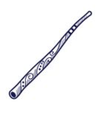 Bunches of English words are imitative, or onomatopoeic. Some have even been put to music… Splish-splash I was taking a bath This post considers some not-quite top-40s, yet equally enjoyable examples. Didgeridoo, an aboriginal Australian word, was first written down in English in 1924. Presumably, the name imitates a didgeridoo’s sounds just as it is filled with air. Another great music-related onomatopoeic word is oom-pah, born in 1877 (when John Phillips Souza was only twenty-three years old). This word is imitative of the sounds made by the tuba and sousaphone. Starting out meaning mindless babbling, & morphing into a word meaning crazy or silly, we have gaga, which appeared in English in 1920. We call a petty quarrel a spat, because spat sounds like a slap or smack, often an element in a petty quarrel. Spat first showed up in English in 1804. Squabble most likely has imitative roots, also. It seems some Scandinavian speakers had an onomatopoeic word referring to a babbling quarrel. This word made its way into English somewhere around 1600 in the form of squabble. Squabbles or spats might also include any number of words imitative of a hit or strike. Slap, whack, thump, bonk & bash are examples. Heaps of imitative words refer to the noises we sometimes make: he-he, imitative of laughter, showed up sometime before Middle English yodel showed up in English in 1827 hiss showed up as early as the 1300s sneeze showed up in the late 1500s. Its pre-Germanic root (fneu-s) was imitative. howl came to English during the 1200s from an unspecified Germanic language guffaw showed up in English from Scottish in 1720 gag appeared in the 1400s & may have Old Norse onomatopoeic roots blather has either Scottish or Old Norse roots, both of which are imitative. Keep your ears open this week for words that just might be imitative. And in all your spare time (ha!) feel free to leave a comment. My thanks go out to this week’s sources: OED, Didgeridoo Origins & Use, Merriam Webster, Wordnik, & Etymonline |
I write for teens & tweens, bake bread, play music, and ponder the wonder of words in a foggy little town on California's central coast.
To receive weekly reminders of new Wordmonger posts, click on "Contact" & send me your email address. Archives
November 2023
|


 RSS Feed
RSS Feed